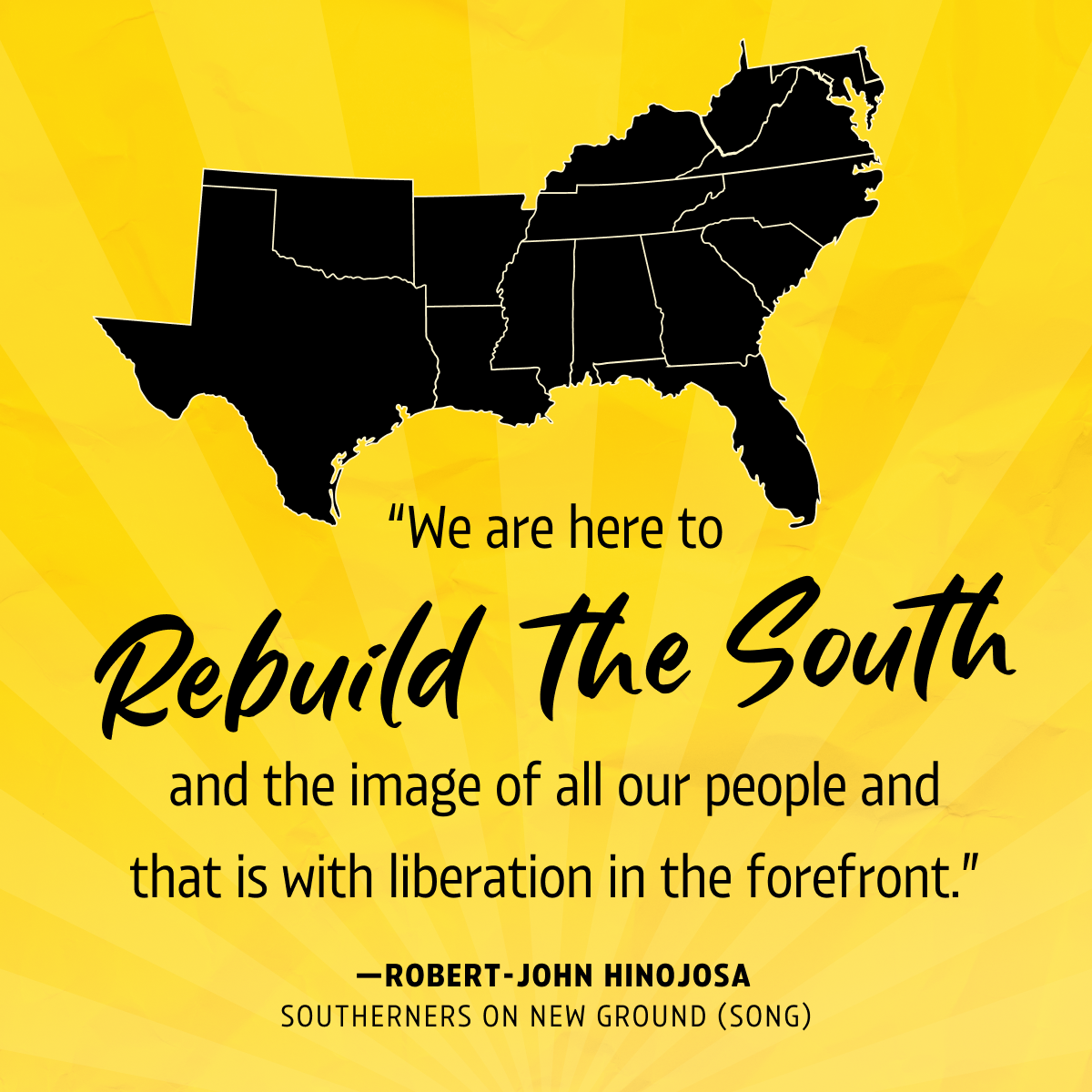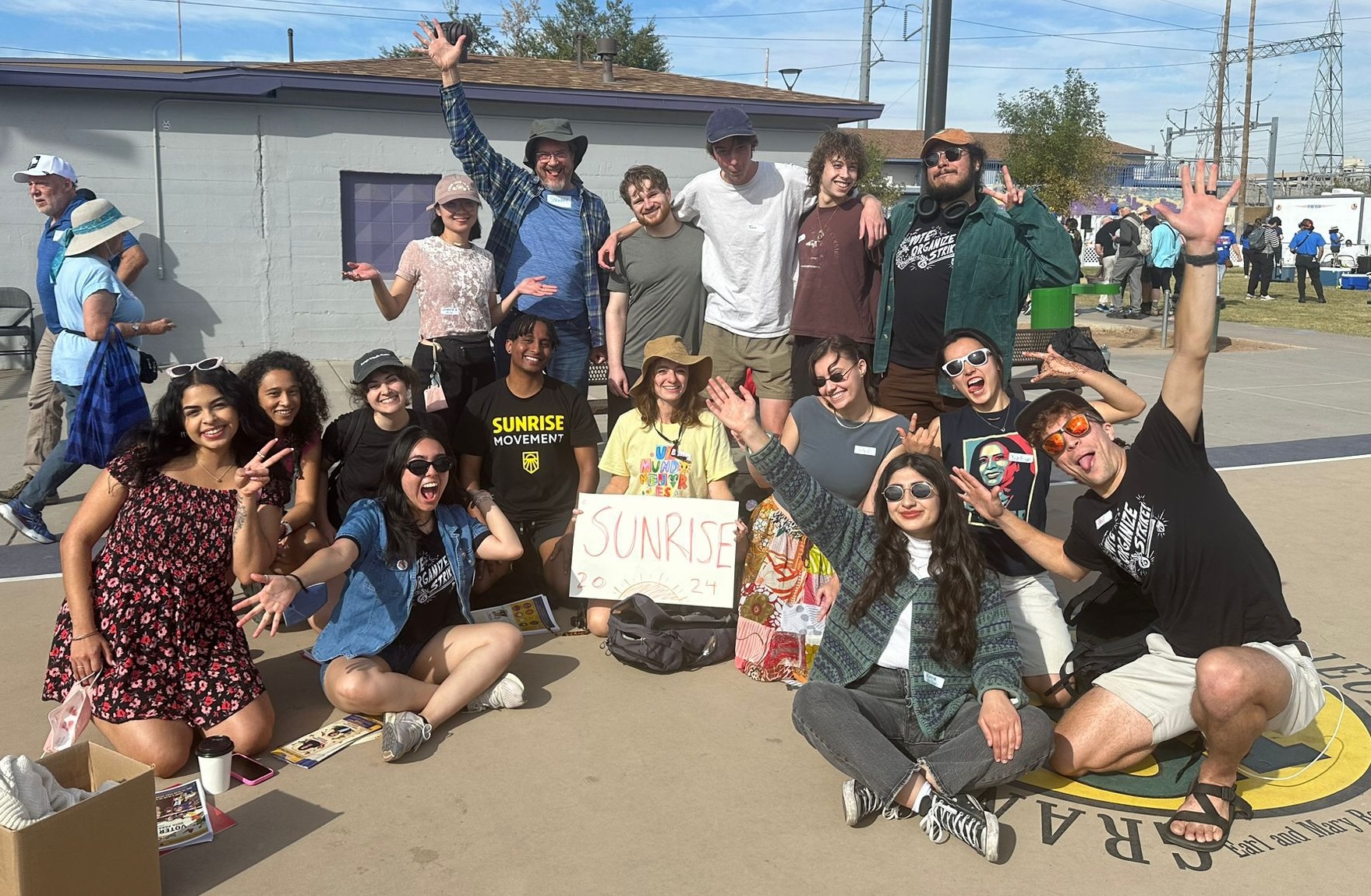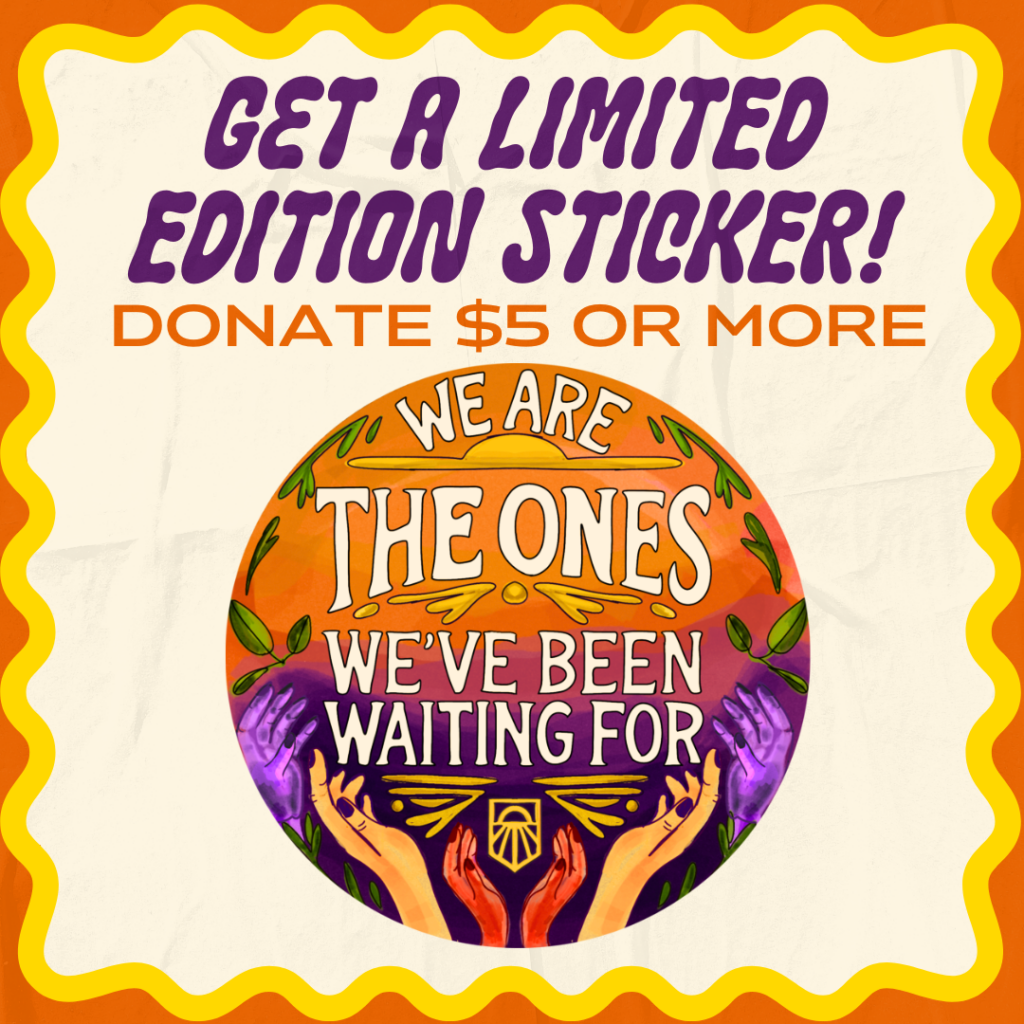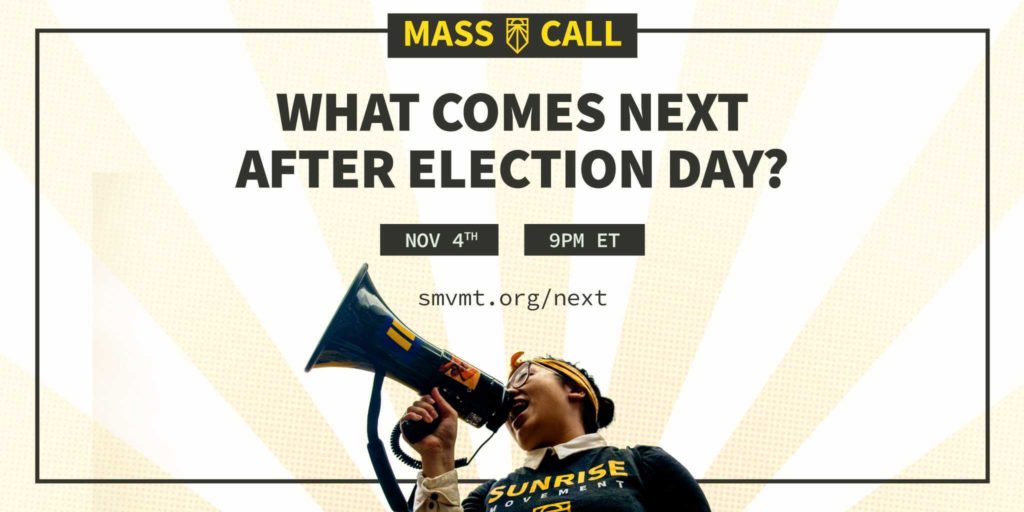On November 23, 2021, Nakia Stephens, Sunrise Social Media Lead, joined Southerners on New Ground (SONG) Campaign Lead, Robert-John Hinojosa, for a conversation on community organizing, people-centering, and multiracial and cross-class organizing in the South.
SONG is a movement for LGBTQ liberation across all lines of race, class, abilities, age, culture, gender, and sexuality in the South. SONG envisions a sustainable South that embodies the best of its freedom traditions and works towards the transformation of our economic, social, spiritual, and political relationships. They envision a multi-issue southern justice movement that unites us across class, age, race, ability, gender, immigration status, and sexuality; a movement in which LGBTQ people – poor and working class, immigrant, people of color, rural – take our rightful place as leaders shaping our region’s legacy and future. They are committed to restoring a way of being that recognizes our collective humanity and dependence on the Earth.
Interview
Nakia:
If you could just state your name, pronouns, your current role in SONG and your story. This can be something super brief or a little bit longer if you would prefer, but we’d love to hear about your personal journey and how that fits into your organizing with SONG.
Robert-John:
Hey, so my name is Robert-John, two words, one name, very Southern, very sassy. I use he/him pronouns. My current role is Campaign Lead for the C3 as well as our C4 and our PAC. My story and how I came involved with SONG… I started organizing before most of you all were even born. So I was a little shorty in the nineties and I got involved in civil rights coordination with the NAACP and the Urban League as a youth and later into the late 90’s where I already had come out and been kind of involved in LGBT spaces. I happened to be at a Pride and was asked by a group of people and was told I should meet this really amazing dope person who turned out to be Mandy Carter. One of the co-founders of SONG and just a brilliant, brilliant person…
And so, Mandy Carter, she brought me closer to the fire, invited me to go to the Highlander Center, and that’s where I ended up meeting a number of the other co-founders of Southerners on New Ground. And some of those organizers there shortly thereafter, I was part of SONG’s board and was then just doing my own organizing here in South Carolina, and also growing with them, getting my political education up through the first Native collective. I just kind of started building up my political education and my ideologies of what it means to be abolitionist. And then that kind of leads us into 2019 and Southerners On New Ground as a C3, starting to have a deeper conversation of what it looks like for us to really push from material, conditional change for our people.
Nakia:
I love that. Love everything that you were saying, especially about the autonomy aspect. I think there’s always this narrative to push and push and push and push and go straight for the hard ask. And that’s what turns people off from engaging with you period. Whether you’re trying to get them to donate a little something or just turn out and get involved in community events.
Robert-John:
In every space I go into and working with all our chapters, I would tell everybody “no’s are sacred.” When you hear a “no,” it is sacred and it ends everything. My job then is to keep moving in this work. So that eventually that yes, becomes blessed. Because then when you come back and it’s “I’m down to do this” or you’ve seen us in action then you can make your choices of what you feel is right. But anytime you hear no. Yeah, you fall back and stop sweating people. I could tell you all day what I do, all day. We could do this all day and it’s lovely, but you’ve seen that work is what really matters. Cause at the end of the day, that work is what pushes you. We bumping gums, isn’t doing anything – just creating hot air. But me actually working: that’s inertia, that’s energy. I’m making something happen. We’re making something, we’re pushing forward. That’s when it all comes together.
Nakia:
I feel I’m already learning so much from you in five minutes! Thank you so much. Okay. Next question. So I feel you kind of already touched on this a little bit, but why campaign so heavily for liberation, in the south specifically? I think the South has a really rich history when it comes to all of this work. Whether that’s abolition, queer rights, fighting for all the different justice that we need. But why the South as a region? Why not New York City or any other space? What’s special about the south to you?
Robert-John:
So one: Outkast told us the South got something to say, but the South has been the nexus of most of our civil rights movement. The South was the creation of this nation. Knowing that the right uses the South as a proving ground for any of their insidious policies, then those policies become legislation, and then they feed into the rest of the nation.
There’s an old adage that goes, “as goes the south, so goes the nation.” So they hold this idea, whatever happens in the south, the whole nation will follow. Whatever, whoever wins the south is going to win any national election. So policies start here in order for us to be able to combat the right and combat those insidious policies.
We see movements come from all places, but best believe that in the South, we have already historically been working through every major movement from environmental to disability, to civil, to human, to occupational, to economics, to domestic, all of it here embedded in the South is an imperialist capitalist system that created this nation with birth in Charleston, South Carolina. Right? So understanding that the South has a root in this country, understanding that the rights, since going, reaching back to Goldwater from the Nixon administration called a Southern strategy that said “all work will be put into the South” and because the South will then take whatever the nation needs to do. So we know that.
I appreciate all work happening all nationally, because all places need work, but the work is here, it’s happening here. Think tanks, your major right wing think tanks are here and also think of your major nuclear power plants. It’s all interconnected. We are here to rebuild the south and the image of all our people and that is with liberation in the forefront. So that’s why we do this work in the South. That’s why we believe in the South. And that’s why we stay in the South.
Nakia:
Absolutely. I’ve loved SONG from afar and like you’ve said, I’ve seen the work and I’ve kind of been invested from a distance, but it’s really amazing to hear you talk so personally about it and I think when you talk to people about SONG, they know the work is happening, that SONG brings something really special to this space that other folks are just not doing.
Okay. I’m going to the next q. I know liberation is a big goal, abolition, any sort of liberation, huge goal. But obviously there are projects and there’s different programs in place to help you all build on that goal, so what’s a current or past project SONG is working on right now that’s important or vital to you?
Robert-John:
I will break that up into two parts because I sit on both sides of the organization. So on Southerners on New Ground or our C3, for me really has been under our umbrella of “Free from Fear,” which is our broader liberation work, which is “End Money Bail,” “Black Mama Bailout,” that work within the community is brilliant. And then there are our Black leadership cohorts, which is the “Lorde’s Work named after Audre Lorde.
Then on my C4 PAC side of SONG Power for me was really one of the things that’s been the biggest highlight was our runoff election work in Georgia for Warnock and Ossoff. A few days after the general election we said “this is what’s going to pop off. Are we going to run an election?” And quick and dirty said yes, yes. Then we got our cohorts and our teams and our commerce together.
And we ran this campaign where we did it in English, Spanish and ASL. We knocked on 150,000 or connected with 150,000 voters in the state. And we did it in English, Spanish and ASL. We did it virtually and we did it in in-person door knocking. We had already worked a previous year, figuring out a hybrid way of how to still have a ground game in our campaigns and still be virtual. And we were one of very few that we knew of any organizations on the left that were actually out being really clear about our CDC policies and following through.
We saw that impetus. We saw people going out, we saw the increase in voting. We saw, we were on our last day, like oh shit we made that happen. GA is blue. And it was, not to take away from anybody else, but we grinded and we saw numbers of the spaces where it didn’t increase. We saw people. We knew, we got people registered. We did that shit. We’re going to get our flowers. And we don’t always win. We lose more than we win.
Nakia:
Oh yeah.
Robert-John:
So when we have wins, especially big wins and wins that we were so committed to that work, was amazing. And then we get off our zoom calls, stretching. I got about a week off before I go back to work and I turn on the TV and these people are invading. There’s an insurrection happening because of January 6th. And that was our last day. And so I saw the junk position of what it looks like when we see Black people and queer people gain power and “this isn’t us” and we’ll slowly go back to Tulsa and to Rosewood.
Nakia:
EXACTLY. I feel there were so many things to even unpack from that. I was just bringing this up, even though you made it sound way better than me. We were talking about our electoral work in Sunrise and how we wanted to build on all this different work. And then we were kind of trying to figure out, okay, so what, how do we tell this story to people? Obviously the electoral piece is, not the end all be all to gaining power. That isn’t the only thing we’re trying to do, but it’s a big part of the story with 2022 midterms coming up especially.
And a lot of folks will be like “I just, I hate this and I don’t want to do it.” And that’s cool too. But also I think it’s important to get to the core of those very specific narratives, like what you were saying. I literally brought that up, around the Reconstruction era when Black folks were starting to thrive, coming out in droves, voting more than white folks and we saw the emergency of poll taxes etc. etc. There’s just so much to say here about building joy while simultaneously building power in communities. And to celebrate those wins.
Robert-John:
Yeah. I think that’s real. And I think political education is fundamental. There’s some folks who can’t vote because the government doesn’t allow them to. And that’s real, there’s other folks who don’t vote because they historically just happen or just don’t know or don’t believe, I’ve heard a number of times in this work, nothing changes or it’s not going to, it is already been decided, sometimes it’s just real talk, how the fuck is me voting, going to change anything. I can’t get the time off. I can’t get this. Who going to take me up there? I don’t ride the bus like that. There’s all kinds of barriers that are real barriers. So it’s also about what can we do if we start to remove some of those barriers, if we start taking some of these barriers away, as we’re also providing a political education. I like political education, I like the broadness of it, but I also believe in political education that’s rooted in where people are at because when you know what your community went through, when you know the land that you’re on, when you understand, “I am on Congaree land,” when you know indigenous people were on these grounds and buried on these grounds, that’s different.
Nakia:
You’re right. So much to think about here with land acknowledgement and knowing how much of your history is rooted in imperialism and colonialism. What do you see as the most challenging part or the biggest obstacle when it comes to organizing in the South or doing this work? What is the big thing? Or maybe it’s a series of little things, but yeah.
Robert-John:
Yeah, for me, it is resources. There are a number of national organizations who don’t want to put any of the resources into the South specifically queer or gay organizations. For this work to be able to progress, we have to have honest conversations about what it looks like when things are transactional, when things are inappropriate and when things are not benefiting our communities.
I really believe that if we want material conditional change and we want to see a shift, I 100% advocate and am on deck for the South. The regional south is where all this work is happening and so much can be blocked from the right. So much can be nipped at the bud with the right resources, with the right power structure.
Because we believe that’s necessary. Because we also, again, we’re not trying to be transactional. We’re trying to see if we can lift you up. And there’s certain things we can’t do. I wish I could get checks to all my people every day. But if we can do some kind of exchange where we can give you more than what the DNC would give or the right would give, then we also are talking about doing that for our community. What ways we can show up and provide for our people. So yes, the challenging part and the biggest obstacle in the South is the lack of resources, a non-commitment from national organizations that run the gamut in their perspectives about why the South is not important. And again, South got something to say, we show up and we come through. And so it will be, it is a time for it to recognize that this work is happening and that investment needs to be here in the South
Nakia:
100%. The whole thread of this conversation is just: you’re right. You’re just right. Okay. So what’s your advice for someone who wants to get involved with SONG, but doesn’t know where to start?
Robert-John:
SONG has chapters throughout the South, so it depends where you live. I guess the best and easiest way is to go to our website. Social media is high, hot. That’s how you can find everything. We have unleashpower.org that gives you all the information around our C4 and our PAC work. Then we have southernersonnewground.org, all one word. And that gives you our C3 too. So you get to get a broader scope of the umbrella work that we do, how we throw down for our vision, how we’re aligned, our history.
Across our social media, we’re @ignitekindred and you can see the work that we’re doing every day. We are not here to bulldoze. We’re here to be in, we’re comrades, we are co-conspirators in all this liberation work. If you are committed, we’re committed. And that’s how we do it.





